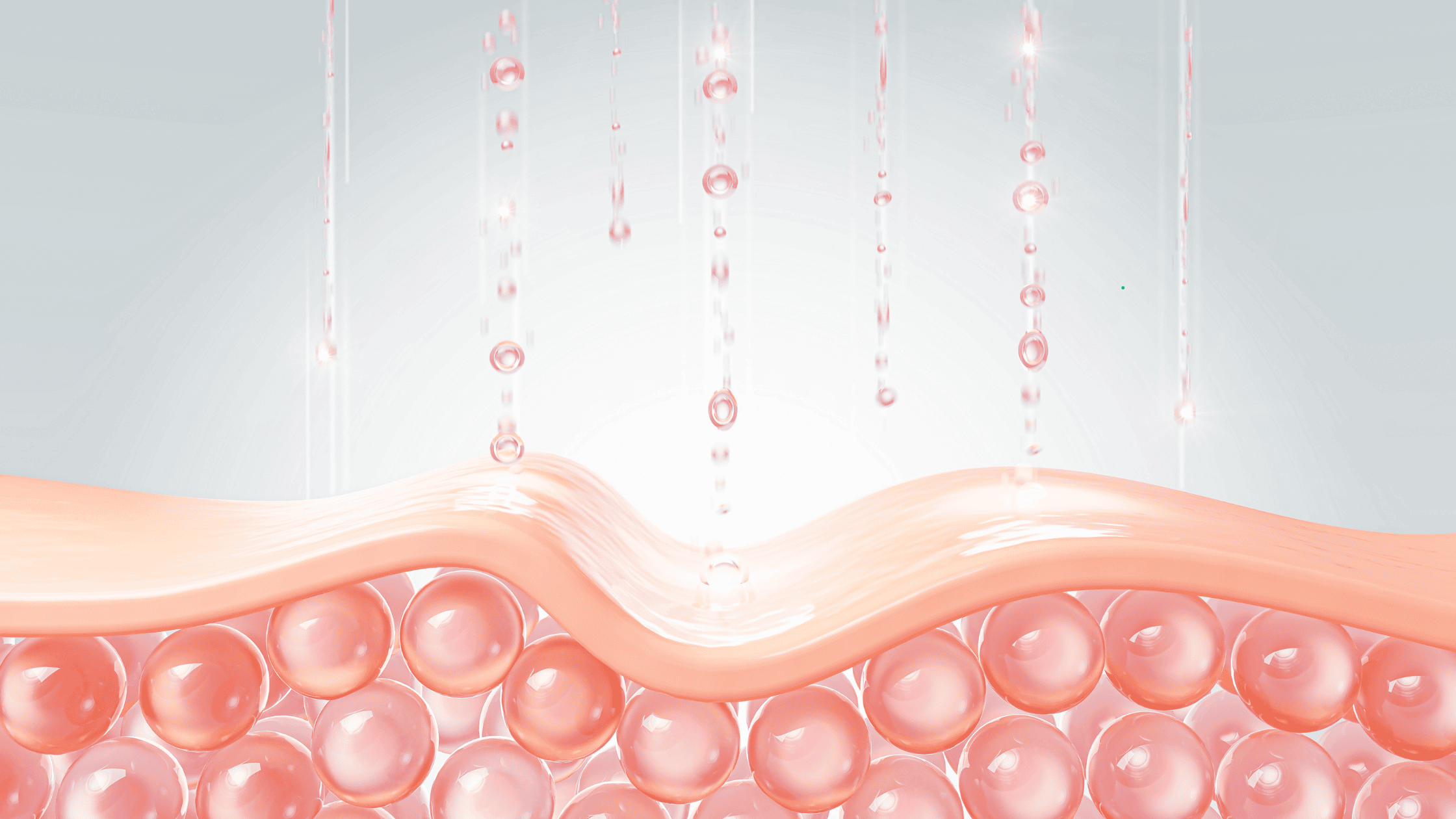
Your skin tells your story. Late nights can leave it dull, stressful weeks show up as breakouts, and over the years, those faint lines start to settle in. All of that ties back to how your skin repairs itself beneath the surface.
Collagen is one piece of that puzzle. It’s the protein your body makes every day to help keep skin smooth, firm, and strong—but production slows with age, and factors like stress and lifestyle can speed that up. The benefits of collagen are getting a lot of attention for good reason. Many people are exploring collagen for acne to support healing and fade lingering marks, and are also turning to collagen for aging to help skin stay more resilient over time.
What is Collagen?
Collagen is the most abundant protein in your body, and it’s everywhere, in your skin, bones, tendons, ligaments, blood vessels, and even your gut lining. It’s the scaffolding that holds your body together. Without it, tissues lose structure, joints feel stiffer, and your skin starts to sag.
At a molecular level, collagen is made of amino acids, primarily glycine, proline, and hydroxyproline, arranged in tight triple-helix structures. These helices bundle together to form fibrils, which in turn form strong connective tissue. Your body doesn’t just “store” collagen like fat or carbs; it’s constantly breaking it down and rebuilding it, which is why your diet, lifestyle, and nutrient intake play a role in maintaining healthy levels.
Collagen isn’t a single type of protein either. There are at least 28 types, but the ones we hear about most often are:
- Type I: Found in skin, tendons, bones — gives structure and strength.
- Type II: Found in cartilage — supports joint health.
- Type III: Found alongside Type I in skin, muscles, and blood vessels — supports elasticity and firmness.
What Are the Benefits of Collagen?
Because collagen is so widespread in the body, the benefits of collagen extend far beyond skin:
- Joint support: Provides cushioning and structural integrity for cartilage and connective tissue, helping reduce discomfort and improve mobility.
- Bone health: Supports bone density by forming the matrix where minerals like calcium can deposit.
- Gut and digestive support: Strengthens the gut lining and connective tissue, which can support overall gut integrity.
- Muscle maintenance: Provides structure and supports lean muscle mass, particularly in combination with resistance training.
- Hair and nail health: Supplies amino acids that contribute to stronger, less brittle hair and nails.
- Wound healing and tissue repair: Helps your body repair damage more efficiently, from minor cuts to surgical recovery.
- Cardiovascular support: Collagen is part of blood vessel walls, contributing to their elasticity and overall vascular health.
And yes, while it shows up all over the body, skin is one of the areas people notice first. Collagen is what keeps skin firm, plump, and resilient, giving it that smooth, springy texture. That’s why so many conversations about collagen for skin health are taking place.
How Collagen Affects Skin Health
At its core, collagen acts like a support net just beneath the skin’s surface. When production is steady, this net stays tight and springy. As collagen breaks down, whether from natural aging, chronic stress, excess sugar (glycation), or even UV exposure, the net loosens. That’s when fine lines deepen, skin feels thinner, and it loses that youthful resilience.
Supporting collagen production or replenishing it through food and supplements isn’t about chasing perfection; it’s about giving your skin the raw materials it needs to repair, renew, and hold onto its strength. That’s the foundation of collagen for skin health—a steady, ongoing process, not a quick fix.
Collagen for Acne and Scarring
Acne is often thought of as a pore problem, but inflammation plays a big role. Chronic inflammation slows skin healing and makes post-acne marks more stubborn. Collagen can help on a few fronts:
- Repairing tissue: Collagen peptides provide the amino acids your body needs to rebuild damaged skin more quickly.
- Improving skin texture: Over time, increased collagen can help smooth the look of indented scars or uneven areas.
- Supporting the skin barrier: A healthy barrier is less prone to irritation, which can reduce the frequency of breakouts.
While collagen won’t “clear” acne on its own, hormones, gut health, and diet all play a role. Using collagen for acne as part of a broader skincare strategy can aid in the recovery phase and reduce lingering marks.
Collagen for Aging Skin
Aging naturally means less collagen. After your mid-20s, your body starts making less each year, and by your 40s and 50s, the difference becomes more noticeable. This isn’t a flaw, it’s biology, but there’s a reason so many people are exploring collagen for aging:
- It may help soften fine lines by improving the skin’s structure from within.
- It can support hydration by increasing your skin’s ability to hold water.
- It helps maintain elasticity so skin looks less “tired” and more resilient.
Supporting Collagen Production Naturally — Especially as You Age
You can’t stop the clock, but you can slow down collagen breakdown and give your body what it needs to keep producing it. Here’s how:
- Prioritize vitamin C – This nutrient is essential for collagen synthesis. Think citrus fruits, bell peppers, berries, and even broccoli. Without enough vitamin C, your body struggles to assemble collagen correctly.
- Include protein-rich foods – Collagen is made from amino acids (glycine, proline, hydroxyproline), so a diet with adequate high-quality protein—like fish, poultry, eggs, and legumes—provides the building blocks.
- Get enough zinc and copper – Found in seeds, nuts, oysters, and whole grains, these minerals act as cofactors for collagen production.
- Limit excess sugar and processed carbs – High sugar intake leads to glycation, where sugar molecules stiffen collagen fibers, making skin less elastic over time.
- Protect your skin from UV damage – Sun exposure accelerates collagen breakdown. Daily SPF goes hand in hand with your collagen efforts.
- Support gut health – A healthy gut helps you absorb the amino acids and nutrients needed for collagen. Chronic gut inflammation can interfere with how your body uses them.
For those interested in collagen for skin health, this natural support enhances the effectiveness of any collagen you consume, whether from food or supplements. Think of it as setting the stage for your skin to repair and replenish more efficiently. Bioenergetic testing can add another layer of clarity by highlighting nutrient, digestive, or hormonal stress patterns that may be affecting collagen production or skin repair.
Collagen Supplements: Types, Timing, and What Really Works
There’s a lot of marketing around collagen, but here’s what matters most when you’re considering a supplement.
What Types of Collagen Are There?
- Bovine collagen (from cows) – Rich in Type I and III collagen, the types most abundant in skin, hair, and nails.
- Marine collagen (from fish) – Primarily Type I collagen, often considered slightly more bioavailable due to its smaller particle size.
- Chicken collagen – Usually Type II, more often used for joint support than skin.
For most people, focusing on collagen for acne or collagen for aging, bovine or marine are the most studied and widely recommended.
How Long Does Collagen Take to Work?
Collagen isn’t instant. Most studies show noticeable changes in skin hydration, elasticity, or texture after 8–12 weeks of consistent use. Some people notice improvements sooner, especially in terms of hydration or plumpness, but true remodeling of the skin’s structure takes time.
Does Collagen Need Help to Be Absorbed?
Yes, look for hydrolyzed collagen (also called collagen peptides). This form is broken down into smaller chains of amino acids that your body can actually use. Pairing collagen with vitamin C may also help, as vitamin C is critical in collagen synthesis.
Do You Need Multiple Types?
Not necessarily. For skin-focused benefits, a single high-quality source—either marine or bovine—is typically enough. Some people rotate or combine sources, but research doesn’t strongly show that “more types” equals better skin results.
Other Collagen Facts Worth Knowing
- It’s safe for most people – Collagen is a food-based protein, not a hormone or stimulant.
- It’s not a stand-alone solution – Collagen works best when combined with nutrient-dense food, hydration, and good sleep.
- Powders vs. capsules vs. drinks – The form matters less than the dose (generally 5–10 grams daily for skin studies).
Supporting collagen production naturally, through nutrient-rich foods, a balanced lifestyle, and the right collagen supplements, can make a visible difference in your skin’s elasticity, smoothness, and overall glow.
The benefits of collagen go far beyond just a plumper complexion. From easing joint stiffness to supporting your gut and even helping with acne, this protein works behind the scenes to keep things running smoothly. When it comes to using collagen for acne and for aging, consistency is key.
Is Collagen Right for You?
Collagen is just one piece of the puzzle. Sleep, stress management, hydration, and a varied diet all play their part. Think of it as a team effort, where collagen is your reliable teammate, ready to step up when you give it the right conditions.
Those conditions include amino acid and co-factor nutrient balance: testing your nutritional imbalances with a Dietary Scan can reveal any imbalanced amino acids (glycine, proline, and lysine) along with minerals and Vitamin C that help in collagen formation and tissue repair!



